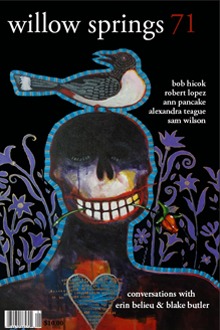
About Charlie Clark
Charlie Clark’s work has appeared in Best New Poets 2011, The Laurel Review, The Missouri Review, The Normal School, Smartish Pace, West Branch, and other journals. He studied poetry at the University of Maryland and lives in Austin, Texas.
A Profile of the Author
Notes on “Selected Poems”
These come from a larger series of sonnets about the devil. Throughout the series- in these two poems in particular- see a couple of primary avenues of exploration that play off of and interact with one another. The first is content-based. I find something pleasurable in the humanizing of supernatural beings, and finding ways to describe objects and images that enrich that characterization. The second motivation is more structural: playing with the form of the sonnet, working with the breath of the line, and seeing how the accumulation of information line by line leads to something unexpected. With “Devil Collecting Roadkill,” I tried to have the information unveil in such a way that each line contains an intact thing/image/thought that relates to and informs/expands the reader’s understanding of what’s come before. The lines are mostly end-stopped or have end punctuation, so each line has a structural integrity. I like the idea of each line noticeably standing as its own discrete thing. The image/scenario in this particular poem came from seeing (and nearly cycling over) some actual roadkill on a bike route I rode for several weeks. It wasn’t the most pleasant thing to go past, but over time it kind of normalized into a familiar part of my ride. Then, one day, it was gone. And not just dragged away by another animal. Clearly someone had removed it. I found myself weirdly hyper-aware of its absence. There is something in that absence, and the removal of its attendant narrative, that I find compelling on a metaphorical level. “Devil’s Materials (Partial List)” is more explicitly “sedimentary” in that it is simply a line-by-line accumulation of descriptions of objects/images. The fact that the poem is all fragments and phrases highlights this, and emphasizes, for me, the pleasure of the utterance. There is also some pleasure in how these objects and images are implicated with the devil by their inclusion in the list. That all of these things are potential means by which one can achieve the kind of corruption or darkness one associates with the devil.
Notes on Reading
Given that I am a creature of my milieu, I am an avid consumer. The objects and ideas that I see play a huge role in informing my creative sensibility. Not only in that I absorb those ideas and objects, but in that I am very aware of the fact that they are shaping my sensibility. So my writing, on conscious and subconscious levels, is deeply indebted to the writing (music, visual arts, etc.) that I consume. While I was reading a lot of different books at the time, the specific initial trigger for these two poems (and the series as a whole) was reading some poems of Kevin Prufer’s from his book Fallen From a Chariot. In them, Prufer describes angels in different scenarios in the contemporary world. The angels had such a tactile presence that I couldn’t help but try and replicate it, albeit in an altered way (cue the devil!). I frequently find myself going back to Kevin Prufer’s work, both that book and National Anthem, for inspiration, or to see how he approaches different problems. I am particularly attracted to how he navigates the impossible as it is located in the actual. So please go read his work! Generally, I can’t say how important interacting with writing and art is to me. Actually, the book I’m currently reading, David Markson’s Wittgenstein’s Mistress, is a great example of a work (of fiction) that engages with art explicitly. In it the narrator is frequently describing works of art she’s seen, read, and heard. It’s also a phenomenal piece of speculative fiction, exploring as it does the experience of suddenly being the only person left on the planet. Markson’s style in this book (and in most of his later novels)-, declarative sentences and paragraphs that frequently undercut and question those that have come before them- an amazing achievement in terms of representing how the mind (well, certain minds, my own most certainly included) operates. Really, there are a million amazing things happening in that book, structurally, philosophically. The fact that the narrator is typing the book out even though she is the last person on earth raises all kinds of interesting ideas about the compulsion to communicate, to create. It’s hard for me to get through more than a few pages of the book without having to find a pen and paper to scribble down some idea that it’s triggered. Without books, art, and music, I’d have nothing to write about and no idea how to go about writing.


